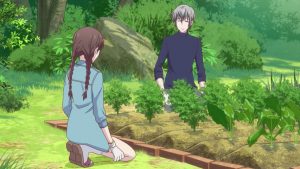 It’s been so long since the first Fruits Basket anime that I freely admit my memories are a bit fuzzy. Not of the overall impression – that’s still surprisingly distinct – but the specifics of how it came to be. So when the 2019 version has its ebbs and flows, it’s hard to know exactly what the context for comparison is. I can tell you that I never experienced a feeling of detachment with the first series as I had been for several episodes preceding last week’s, though how much of that comes down to the vastly greater experience this present me has as an anime viewer is obviously impossible to say.
It’s been so long since the first Fruits Basket anime that I freely admit my memories are a bit fuzzy. Not of the overall impression – that’s still surprisingly distinct – but the specifics of how it came to be. So when the 2019 version has its ebbs and flows, it’s hard to know exactly what the context for comparison is. I can tell you that I never experienced a feeling of detachment with the first series as I had been for several episodes preceding last week’s, though how much of that comes down to the vastly greater experience this present me has as an anime viewer is obviously impossible to say.
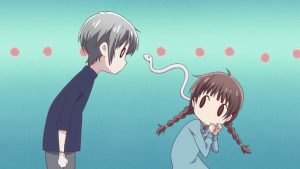 I still tend to think that what we’re seeing here is simply this new series’ fortunes being much more tethered to the material it’s adapting. That makes a ton of sense, given how much emphasis has been placed on rigid faithfulness to the manga this time around. When that material slips that’s obviously a problem, but when it enters a purple patch God’s in his Heaven and all’s right with the world (or, as Netflix would translate it, “my hovercraft is full of eels”).
I still tend to think that what we’re seeing here is simply this new series’ fortunes being much more tethered to the material it’s adapting. That makes a ton of sense, given how much emphasis has been placed on rigid faithfulness to the manga this time around. When that material slips that’s obviously a problem, but when it enters a purple patch God’s in his Heaven and all’s right with the world (or, as Netflix would translate it, “my hovercraft is full of eels”).
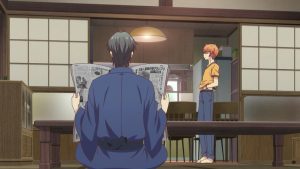 Given the nature of Furuba, the manga’s fortunes are so often tied to the new Sohmas as they’re introduced one by one (or two by two). We’ve seen the feast or famine inherent in that with the likes of Momiji (though to be fair he’s closer to a fourth main planet than a satellite) and Kagura. One (two) of my favorite cast additions should be happening around Episode 20, but this week sees the introduction of a character generally much-liked by fans of the manga and first series – the snake of the zodiac, Sohma Ayame (Sakurai Takahiro). He makes a grand entrance by slithering inside Honda’s dress and never really looks back.
Given the nature of Furuba, the manga’s fortunes are so often tied to the new Sohmas as they’re introduced one by one (or two by two). We’ve seen the feast or famine inherent in that with the likes of Momiji (though to be fair he’s closer to a fourth main planet than a satellite) and Kagura. One (two) of my favorite cast additions should be happening around Episode 20, but this week sees the introduction of a character generally much-liked by fans of the manga and first series – the snake of the zodiac, Sohma Ayame (Sakurai Takahiro). He makes a grand entrance by slithering inside Honda’s dress and never really looks back.
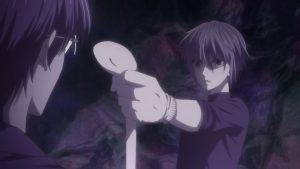 Ayame is a character I can see being divisive, especially as played by Sakurai-san at his most vampish. But hey, I like him a lot and always did – he’s genuinely funny, authentically outrageous and not without a core of legit emotional complexity. Sakurai is an actor with a lot of range but he’s playing this very much in his core persona. As I noted last week the cast of this version, while fine, is perhaps a bit lacking in distinctiveness, so a performance like Sakurai’s here plays as a refreshing contrast rather than as overbearing. He’s a good fit, and so is Ayame.
Ayame is a character I can see being divisive, especially as played by Sakurai-san at his most vampish. But hey, I like him a lot and always did – he’s genuinely funny, authentically outrageous and not without a core of legit emotional complexity. Sakurai is an actor with a lot of range but he’s playing this very much in his core persona. As I noted last week the cast of this version, while fine, is perhaps a bit lacking in distinctiveness, so a performance like Sakurai’s here plays as a refreshing contrast rather than as overbearing. He’s a good fit, and so is Ayame.
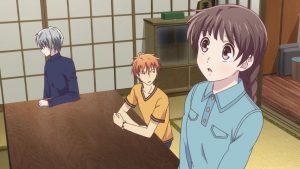 The backstory here is pretty straightforward (even if Ayame is not). He’s Yuki’s big brother by ten years, and they have a relationship that’s not so much strained (though Aya’s antics with Honda strain it) as removed. It’s with Shigure and Hattori-san – his age contemporaries and high school classmates – that Ayame has a relationship that feels more brotherly. Hattori he especially idolizes, for he possesses the qualities Aya is aware are lacking in himself – dedication, seriousness, and an ability to subvert his own feelings and act for the benefit of others.
The backstory here is pretty straightforward (even if Ayame is not). He’s Yuki’s big brother by ten years, and they have a relationship that’s not so much strained (though Aya’s antics with Honda strain it) as removed. It’s with Shigure and Hattori-san – his age contemporaries and high school classmates – that Ayame has a relationship that feels more brotherly. Hattori he especially idolizes, for he possesses the qualities Aya is aware are lacking in himself – dedication, seriousness, and an ability to subvert his own feelings and act for the benefit of others.
 As Ayame has gotten older he’s come to recognize what’s lost by having no relationship with his brother (this is so often the case with siblings) and his desire to build one seems genuine. Naturally Honda wants to help – she’s Honda – but the wall of resistance from Yuki is formidably high. But no matter his desire, Ayame is congenitally incapable of not acting with irreverence. He does, however, seems to instinctively realize that the way to Yuki’s heart lies through Honda, and that she’s open to bonding with him in a way his brother is not. Though she doesn’t realize it, when she talks of the brothers “meeting halfway”, she’s really talking about herself being that meeting point.
As Ayame has gotten older he’s come to recognize what’s lost by having no relationship with his brother (this is so often the case with siblings) and his desire to build one seems genuine. Naturally Honda wants to help – she’s Honda – but the wall of resistance from Yuki is formidably high. But no matter his desire, Ayame is congenitally incapable of not acting with irreverence. He does, however, seems to instinctively realize that the way to Yuki’s heart lies through Honda, and that she’s open to bonding with him in a way his brother is not. Though she doesn’t realize it, when she talks of the brothers “meeting halfway”, she’s really talking about herself being that meeting point.
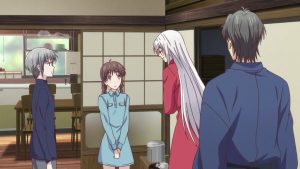 Again – and encouragingly – we’ve seen pretty good comic chops from this series. All of Ayame’s flashback stories are hilarious, but I especially loved the meeting with the parents of the students who visited the pleasure quarter during the school trip to Kyoto. The talk here is unusually frank for a mainstream (read: non-BL) manga written in the late 20th century. All in all, it’s just another really good episode – and if one looks carefully, they can see the way the various pieces of the puzzle are starting to come together to create the overall picture Takaya is painting with Fruits Basket.
Again – and encouragingly – we’ve seen pretty good comic chops from this series. All of Ayame’s flashback stories are hilarious, but I especially loved the meeting with the parents of the students who visited the pleasure quarter during the school trip to Kyoto. The talk here is unusually frank for a mainstream (read: non-BL) manga written in the late 20th century. All in all, it’s just another really good episode – and if one looks carefully, they can see the way the various pieces of the puzzle are starting to come together to create the overall picture Takaya is painting with Fruits Basket.


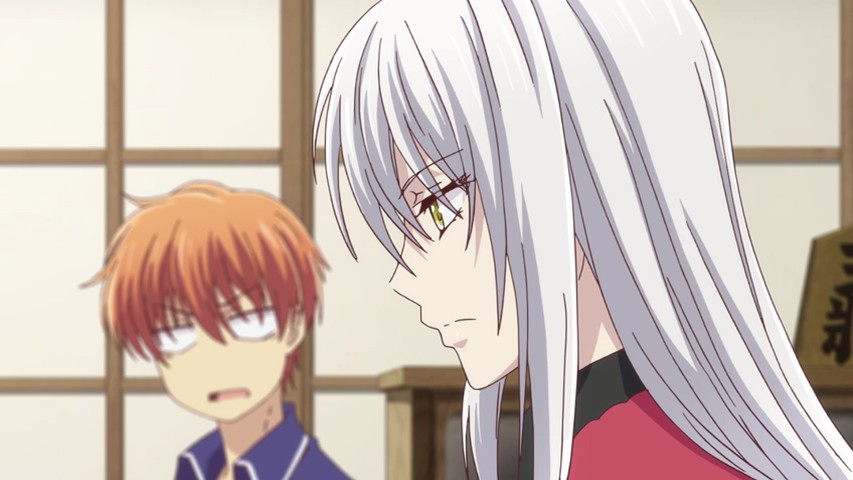



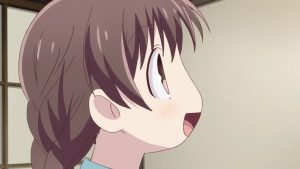



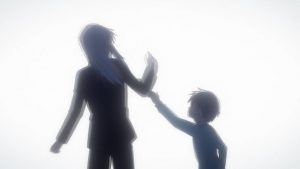
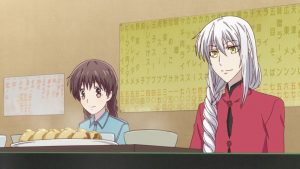
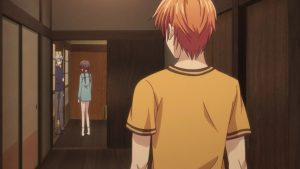
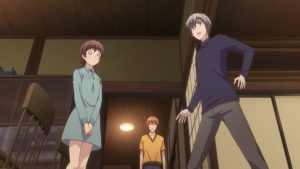
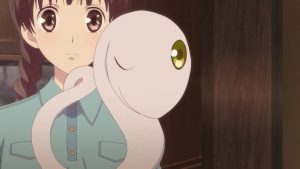
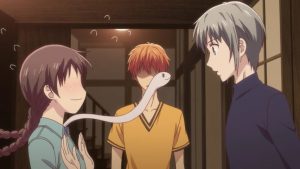

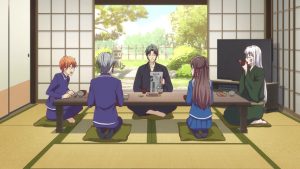
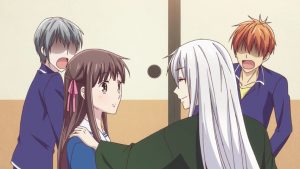
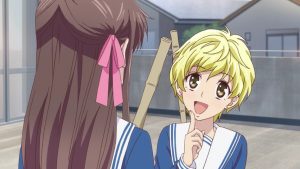
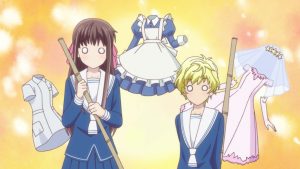
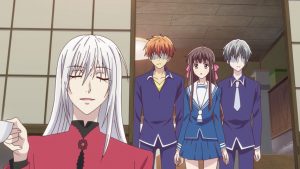
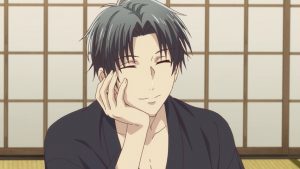
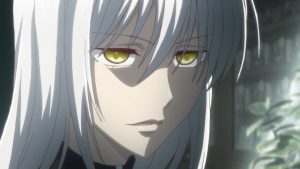

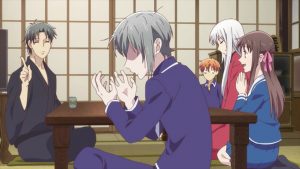

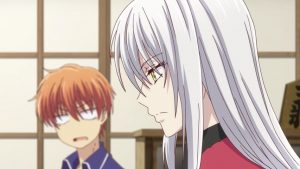

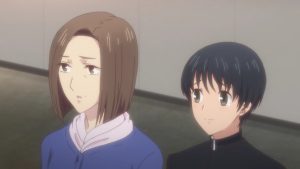
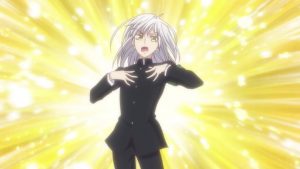
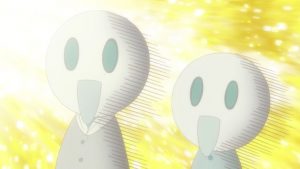
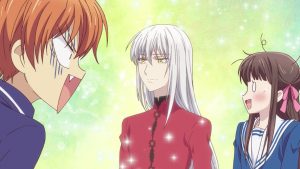

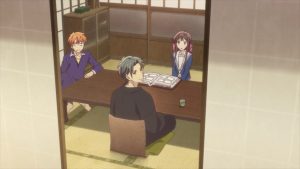
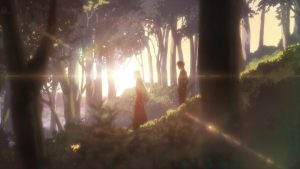

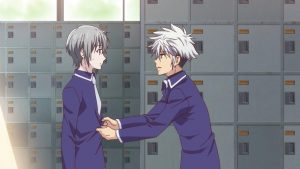

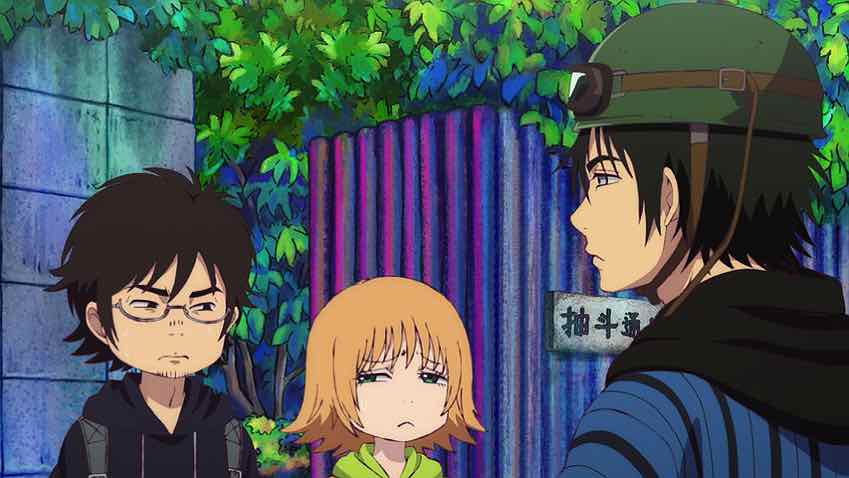
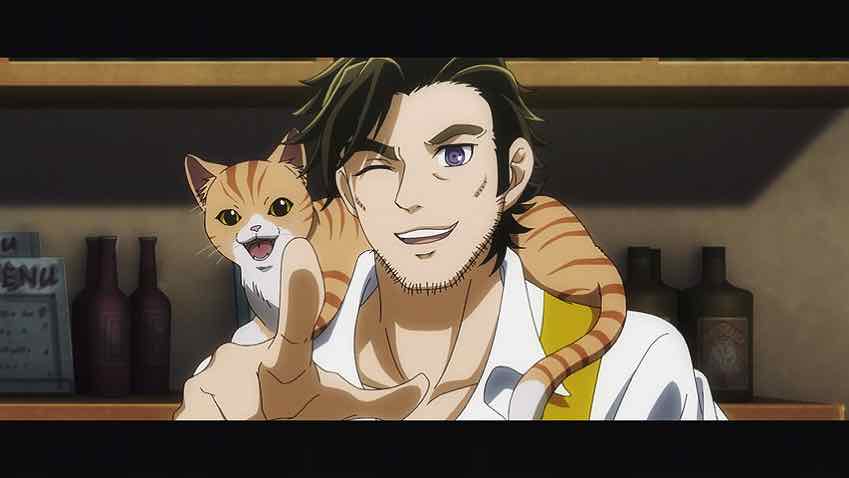
Gracie
June 29, 2019 at 7:04 pmThis was good stuff. Definitely my favorite episode so far. Mitsuru Miyamoto’s original performance as Ayame could be a bit jarring at times (ramped to 11), but it was nothing if not memorable so I’m glad Sakahiro managed to do Ayame justice.
aggies11
July 5, 2019 at 2:30 amIt’s tough to not come off as a broken record on this one. I agree wholeheartedly that this episode has come the closest to what I remember the “feeling” of FruBa to be. Ayame’s portrayal definitely felt the most vibrant of all the cast, which was most appreciated. What I really couldn’t stop myself from missing/being nostalgia for, was the trumpet fanfare that always played as Ayame’s “theme”, from the original series. So over the top and utterly ridiculous that I was always charmed by it. A real good foil to the outlandish antics of Yuki’s older brother. This time around I feel the portrayal of Ayame is a bit more “straight” (apologies for the choice of words), but still a standout so far in this retelling.